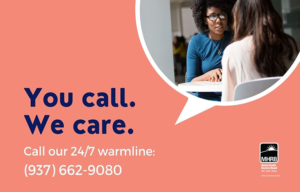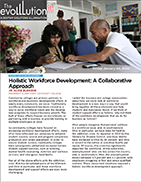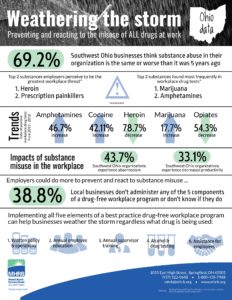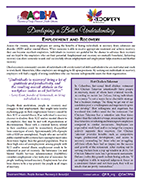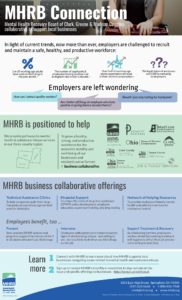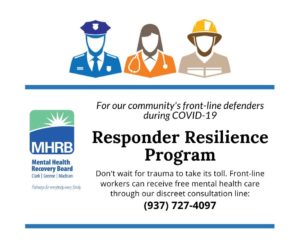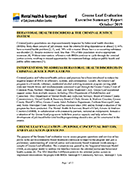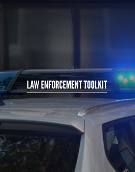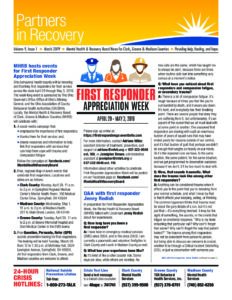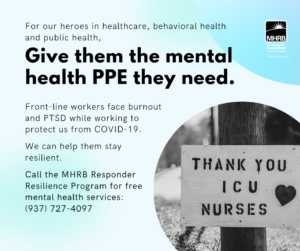- Business & Employers
- Criminal Justice
- Education
- Emergency Services
- Family, Community & Peers
- Healthcare
- Policy & Government
Business and employers.
We often hear from local businesses that they’re struggling to recruit and maintain a safe and drug-free workforce. At the same time, individuals in recovery are ready to work, but often are challenged to find a supportive workplace. MHRB strives to address both workplace and workforce needs, by providing employers with relevant, useful information to create healthy work environments that ultimately will better serve companies, job-seekers, and current employees.
Want to learn more about our work with the workplace and workforce? Sign up for MHRB Connection, our monthly e-blast about mental health and substance use concerns that affect the workplace.

Recovery at Work Toolkit released
The toolkit includes a video, infographic, and article about recovery at work.
MHRB releases information and toolkit about new warmline.
The toolkit includes a frequently asked questions document, sample social media posts and images, and sample email content to promote the new resource.
Holistic workforce development: A collaborative approach
President of Clark State Community College, Jo Alice Blondin, PhD, discusses Clark State's collaboration with Working Partners® and MHRB. Together, they're providing education, written resources, and a tool to audit drug-free workplace (DFWP) efforts against best-practice strategies and hear experience and tips from area businesses who have history running effective drug-free workplace programs.
Addressing harmful use of substances in the workplace.
As part of the Working Partners® Drug-Free Workforce Community Initiative (DFWCI), MHRB helped collect regional data for a statewide survey assessing businesses' perceptions, attitudes, knowledge, and practices related to preventing and addressing the harmful use of substances in the workplace.
Check out our infographic to learn about some of the findings and how it impacts your business.
MHRB helps win $900,000 grant from USDHHS.
Clark State Community College recently was awarded an almost $900,000 grant from the United States Department of Health and Human Services to address the opioid epidemic. MHRB assisted with the grant application and will provide ongoing support as needed. The dollars will help Clark State establish a paraprofessionals certificate. "The workforce problem in our area is three-fold: there is a significant workforce shortage, providers compete for the limited pool of skilled workers and entry-level workers could be retained and move-up by raising their trauma-informed, integrated addiction competencies and credentials," said CEO of the Mental Health Recovery Board of Clark, Greene and Madison Counties, Greta Mayer.
Mental Health Recovery Board of Clark, Greene & Madison Counties collaborative to support local businesses
To grow a healthy, strong, and productive workforce for the economic stability and well-being of our businesses and residents we’ve formed a business collaborative. Find out more in our infographic.
Criminal justice.
Nearly a third of Ohio's inmates live with mental illness, and these individuals often stay in jail longer and have higher rates of recidivism. Nationally, three out of four incarcerated individuals with mental illness also have co-occurring substance use disorders. MHRB works with community partners like sheriffs, jail administrators, judges, corrections professionals, treatment providers, people with lived experience and their families, and other stakeholders to coordinate a caring system that ensures a safety net for families, adults and children. The goal of this work is to help individuals with mental health or substance use concerns get the help they need rather than end up in the criminal justice system. Our criminal justice-related work includes:
- Stepping Up, which is a national initiative to reduce the number of people living with mental illness in jails. In Ohio, counties can declare themselves as Stepping Up communities. Clark County Commissioners declared Clark County a Stepping Up community in October 2018.
- Sequential Intercept Mapping (SIM) is a model used for evaluation and planning of the criminal justice system. It looks at several places, or intercepts, where interventions can occur to reduce the risk of having individuals with mental illness end up in jails, rather than treatment. MHRB hosted a SIM exercise in Clark County in March 2019. The Clark County Sequential Intercept Mapping and Action Planning for Opioid Epidemic Response is available online.
- SIM also was used as a guiding framework for the Greene Leaf evaluation, which examines the effectiveness of Greene Leaf, a program that serves offenders within the Greene County Sheriff’s Office Jail Division
- Crisis Intervention Team (CIT) training for law enforcement is an internationally recognized best practice for law enforcement as they respond to crisis situations involving individuals in the community living with mental illness or substance use concerns. MHRB offers a free, 40-hour CIT training each fall. Throughout the week, participants learn about topics like involuntary hospitalization, client rights, psychiatric medications, trauma, and hear from individuals with lived experience.
- Supporting certified specialized dockets, including Fairborn Municipal Drug Court and Greene County Common Pleas Veterans Treatment Court.

Responder Resilience Program
The new, free Responder Resilience Program will connect anyone working in front-line occupations in Clark, Greene and Madison counties to consult with mental health professionals trained to treat trauma and trauma-related symptoms. Learn more in our press release and FAQs.
MHRB releases information and toolkit about new warmline.
The toolkit includes a frequently asked questions document, sample social media posts and images, and sample email content to promote the new resource.
Sequential Intercept Mapping and Taking Action for Change
The purpose of this report is to provide a summary of the Sequential Intercept Mapping and Taking Action for Change workshops held in Clark County, Ohio on April 23-24, 2019. The workshops were made available through 21st Century CURES Act grant funding awarded to the Ohio Department of Mental Health and Addiction Services. Cross-System Sequential Intercept Mapping, implemented by the Criminal Justice Coordinating Center of Excellence, is one of the criminal justice efforts in response to the opioid epidemic.
Greene Leaf Report
Mental Health Recovery Board of Clark, Greene & Madison Counties (MHRB) has funded Greene Leaf Therapeutic Community, Inc. for many years, together with the courts and Sheriff’s department. We just finished a formal evaluation of the program to: find out how Greene Leaf’s operations and services align with best practices in the criminal justice and behavioral health fields, learn more about the demographics of offenders served at the program, learn what type and amount of services provided to offenders, and identify the impact that Greene Leaf has on select criminal justice and behavioral health treatment outcomes. Read the report to learn more.
Education.
Recognizing that sound prevention practices can occur throughout the lifespan to prevent problems later in life, we support prevention on all levels: early childhood mental health consultation, K-12 strategies, and in higher education settings. We know that delivery of sound, evidence-based prevention in schools will help instill positive mental health and coping skills in their youth and reduce risk of problems.
In order to support this, we host a Prevention Professionals Learning Community (PPLC) that allows local preventionists to deepen their knowledge, builds capacity by helping others receive prevention certifications, and promotes sharing of best practices. To learn more about PPLC, contact Jim Ryan or view past agendas.

MHRB releases information and toolkit about new warmline.
The toolkit includes a frequently asked questions document, sample social media posts and images, and sample email content to promote the new resource.
Handle with Care Notice – Trauma Informed Care Project
Handle with Care is an innovative collaboration between schools, criminal justice, and care providers that allows schools to be trauma informed. Through the project, officers complete a Handle with Care notice when they encounter a school-aged child who has been exposed to a crime, violence, or abuse, and send it to the child’s school. While the school doesn’t receive details about the incident, the notice allows them to create a trauma-sensitive environment, reducing the risk of further problems and allowing the affected child to be supported at school. Learn more about Handle with Care in each of our counties here.
Prevention Professionals Learning Community
Prevention Professionals Learning Community (PPLC) is a vibrant prevention professional community committed to excellence in prevention planning, implementation, and evaluation and the continued development of individual professionals and the overall prevention profession within Clark, Greene & Madison Counties.
Project AWARE Ohio
Emergency services.
Day after day, police officers, firefighters, and emergency medical services (EMS) workers risk their lives in the name of public safety. Yet oftentimes, stigma and other barriers prevent them from seeking help to process the daily trauma that they encounter. As a result, first responders are at a greater risk for mental health problems and now are more likely to die by suicide than in the line of duty, according to a white paper by the Ruderman Family Foundation. We’re here to help connect first responders to comprehensive, local mental health and substance use services—and to advocate for systematic change that will help break down the barriers standing in their way.
In addition to helping connect first responders to care, we also offer a free, 40-hour intensive Crisis Intervention Team (CIT) training for law enforcement each fall. CIT is an internationally recognized best practice for law enforcement as they respond to crisis situations involving individuals in the community living with mental illness or substance use concerns. Throughout the week, participants learn about topics like involuntary hospitalization, client rights, psychiatric medications, trauma, and hear from individuals with lived experience. CIT training is supported by NAMI of Clark, Greene and Madison Counties and is planned by a multidisciplinary planning committee that ensures the material is relevant and effective.
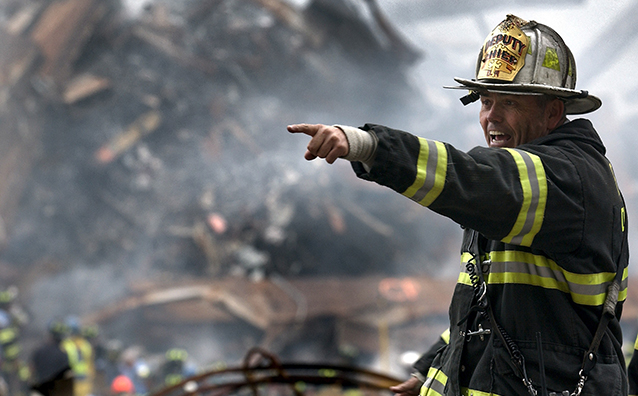
Responder Resilience Program
The new, free Responder Resilience Program will connect anyone working in front-line occupations in Clark, Greene and Madison counties to consult with mental health professionals trained to treat trauma and trauma-related symptoms. Learn more in our FAQs.
MHRB releases information and toolkit about new warmline.
The toolkit includes a frequently asked questions document, sample social media posts and images, and sample email content to promote the new resource.
Secondary Trauma in Frontline Helping Professions
Many people have or will experience a traumatic event in their lifetime. In most cases, a person can return to normal functioning through relying on support systems and without significant disruption to their lives. But for people in some professions, exposure to traumatic events can occur regularly, even daily. When we think of professions for whom trauma exposure is most prevalent, those in our frontline helping professions come to mind.
Crisis Intervention Team
MHRB offers Crisis Intervention Team (CIT) training for law enforcement each fall. CIT is an internationally recognized best practice for law enforcement as they respond to crisis situations involving individuals in the community living with mental illness or substance use concerns. Please see presentation material from our 2019 CIT training for more information.
Family, community and peers.
We know that finding the right care for mental health and substance use concerns can be hard. That’s why we exist; to provide resources and pathways to care for everybody and every family in Clark, Greene, and Madison Counties. Whoever you are, find resources for prevention, treatment, and support below.
Loved ones of someone living with a mental illness or substance use concern
It’s not uncommon to encounter legal challenges when a loved one has mental health or substance use concerns. You can always call our contract care providers for individual consultation, but these resources can be a helpful start:
- Probate court & civil commitment
- Durable POA for Healthcare
- Advanced directives form
- National Alliance on Mental Illness (NAMI)
- Families of Addicts (FOA)
- The Hope Spot
Farmers
Research suggests that farmers not only have high suicide rates, but that they also are at risk for experiencing depression, anxiety, and substance use issues. Given these challenges, Ohio Mental Health & Addiction Services and Ohio Department of Agriculture created a campaign about farmer mental health. Access the Got Your Back campaign here.
Community members
Do you want to make a difference in local mental health and substance use? Learn more about how to join a coalition in your area here:
- Clark County Substance Abuse, Prevention, Treatment, and Support Coalition
- Clark County Suicide Prevention Coalition
- Greene County Drug-Free Coalition
- Greene County Suicide Prevention Coalition
- Madison County We CARE Coalition
More information can be found on our events page.
Peers and individuals in recovery
Peers are individuals with lived experience who work professionally to help others find recovery from mental illness or addiction. Mental Health Recovery Board of Clark, Greene & Madison Counties (MHRB) is dedicated to ensuring that peers receive the training and support they need. This is integral to the success of peers to help others and to maintain their own recovery. Peers experience risk due to having lived experience and by the very nature of their work (e.g., exposure to people in active addiction, risky environments, and hearing traumatic stories over time). The Board recognizes this delicate balance and works to have an ongoing conversation with care providers about how to keep peers healthy and well.

MHRB releases information and toolkit about new warmline.
The toolkit includes a frequently asked questions document, sample social media posts and images, and sample email content to promote the new resource.
Healthcare.
It’s no secret that many issues related to mental health and substance use—like the opioid epidemic, suicide crisis, the effects of trauma, and social determinants of health (for example, access to safe, affordable housing)—impact physical health. That’s why MHRB partners closely with our local health districts and other health partners to develop and execute Community Health Assessment (CHA) and Community Health Improvement Plans (CHIP). Learn more about each county’s CHA/CHIP process:
Clark County
Greene County
Madison County
It’s also why we work with other system partners, like hospitals, primary care providers, pharmacists, prescribers, emergency room staff, and first responders to address these issues together. We all have a stake in creating a healthy, vibrant community and are committed to working together to find joint solutions.

Responder Resilience Program
The new, free Responder Resilience Program will connect anyone working in front-line occupations in Clark, Greene and Madison counties to consult with mental health professionals trained to treat trauma and trauma-related symptoms. Learn more in our press release and FAQs.
MHRB releases information and toolkit about new warmline.
The toolkit includes a frequently asked questions document, sample social media posts and images, and sample email content to promote the new resource.
The Truth About Adverse Childhood Experiences (ACEs)
The Robert Wood Johnson Foundation is part of a growing network of leaders working to increase awareness and understanding of the impact of adverse childhood experiences (ACEs) and the need to develop effective innovative interventions. Learn more about ACEs and share this infographic with others.
Policy and government.
MHRB advocates for the mental health and substance use concerns for people of all ages and backgrounds, regardless of income or ability to pay. We also encourage and empower individuals in Clark, Greene, and Madison Counties to join us in advocating for quality care by engaging with public officials on issues that are important to them.
Here’s how to reach your public officials:
Clark County
- County Commissioners
- State Representatives
- State Senator
- United States Representative
- United States Senators: Brown, Portman
Greene County
- County Commissioners
- State Representatives
- State Senator
- United States Representative
- United States Senators: Brown, Portman
Madison County
- County Commissioners
- State Representatives
- State Senator
- United States Representative
- United States Senators: Brown, Portman

MHRB is here not only to guide residents to services, but also to provide resources and leadership for mental health and substance use innovation. The following links provide research, guidance, and insight about these topics. Have other questions? Feel free to call us directly.
National Institutes of Health
HIPAA information.
Health Insurance Portability & Accountability Act (HIPAA)
MHRB complies with the health information privacy regulatory requirements set forth within HIPAA. You can view our notice.
A summary of the HIPAA Privacy Rule can be found here.
Additional information regarding HIPAA for individuals and professionals can be found at the U.S. Department of Health & Human Services' Health Information Privacy website.

